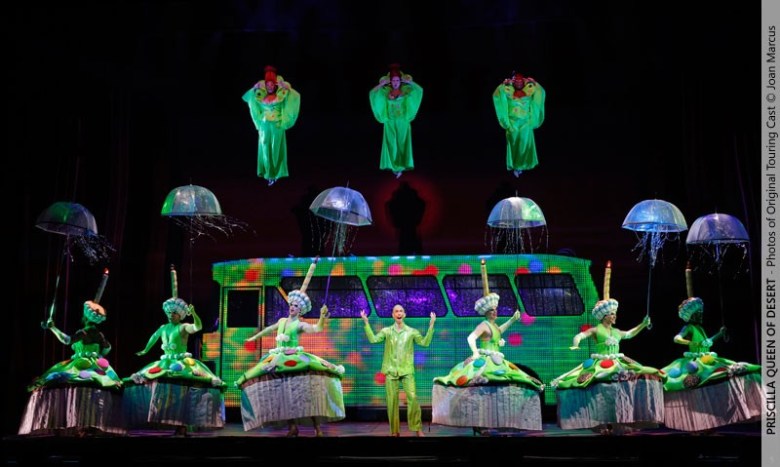

- (c) Joan Marcus
- Fashion risk? Wade McCollum, Scott Willis and Bryan West in PRISCILLA, QUEEN OF THE DESERT
PRISCILLA, QUEEN OF THE DESERT


Durham Performing Arts Center
Through May 5
Its characters may or may not be the kind of folks they used to warn some of us about back on the farm.
But PRISCILLA, QUEEN OF THE DESERT is most definitely the kind of show they warned me about in grad school.
“Beware of spectacle,” one theater teacher said. “Sure, it’s flashy. And it’s undeniably effective—in the short term.
“But as the audience acclimates to it, it takes greater and greater dosages just to have the same effect.”
The professor paused. “Ultimately, it’s unsustainable—and the crash is something wicked.”
That’s precisely the case for this 2006 musical, adapted from the 1994 Stephan Elliott film starring Terrence Stamp, Hugo Weaving (a half-decade before he became Agent Smith in The Matrix), and a pre-Memento Guy Pearce. It took five years for Priscilla to make it to New York—a clear sign of early difficulties. Once it got there, it ran for a little over a year on Broadway, in 2011. Ultimately though, it turns out to be significant that, during that run, Priscilla took only one Tony Award—for costumes.
It all starts so innocently, as ensemble and designers simultaneously embody and poke fun at the campy excesses of the golden age of disco and big city drag shows in the mid-1980s. But by the middle of the first act, Priscilla begins to look and feel as if it’s been hijacked at gunpoint by costume designers Tim Chappel and Lizzy Gardiner.
Shortly after that we learn, to our dismay, that no LED lighting scheme is too garish or improbably placed for designers Nick Schlieper and Jonathan Spencer. But in the most alarming development of all, Stephan Elliott and Allan Scott’s flimsy stage adaptation proves unable to claw its way out from behind a seemingly endless string of musical numbers, or from under the miles of polyester and speculative hairpieces sacrificed in the course of this tribute to progressively worsening taste.

- (c) Joan Marcus
- The mothership has landed: designers Tim Chappel and Lizzy Gardiner’s costumes run amok, in PRISCILLA
Though it will probably come as a shock to audience members of the current production, the original film was much more than a gay-themed jukebox musical. It had significant subtlety and charm—along with camp, comedy and drama—as it followed two fully characterized down-on-their-luck drag queens and one transsexual on their improbable odyssey from a downtown Sydney cabaret to a gig in the middle of the Australian desert. Over the course of the film we learn that Tick, the character who got them the job, has a wife there. And a child, now eight years old, who wants to meet him.
Most of those refinements are marred in this production, some beyond recognition, in non-musical scenes as awkward as they are brief.
By intermission, we couldn’t imagine how the designers could possibly top the ludicrous extremities we’d already witnessed. Then we found out—again and again—despite a computer malfunction that took out part of the show’s automated set pieces on Tuesday night.
Bryan West gave enough lemon to Adam, the trio’s bitchy foil, and Scott Willis lent the aging Bernadette convincing regality and grace. We couldn’t have been more disposed toward Wade McCollum in the lead role here as Tick, the worried gay man whose past and progeny awaits him in Alice Springs.
But our sympathies zeroed out for this production when it threw him and his character under the bus, as it were, in a musical staging of “MacArthur Park” that easily qualifies as one of the most desperate acts I’ve ever seen on a stage.
Joe Hart provided the show with a modicum of down-home outback amiability as Bob, the mechanic who rescues the crew when their bus breaks down. And Nik Alexzander and Travis Taber livened up things in their brief respective roles as Sydney club host Miss Understanding and a younger Bernadette, reliving her glory days in Les Girls. Christy Faber and child actor Shane Davis supported in their rare appearances as mother Marion and son Benji.
But simply unbuyable escapes along the way, in a club in Broken Hill and particularly the mining town of Coober Pedy, sacrificed too much credibility in this supposed tale of gay triumph against the odds.
Audiences leaving this exercise in increasingly wretched excess will likely have learned the difference between being browbeaten and being entertained. They’ll also know something we wish this show’s designers had learned before signing on to Priscilla: Sometimes, too much of a good thing—is just too much.


